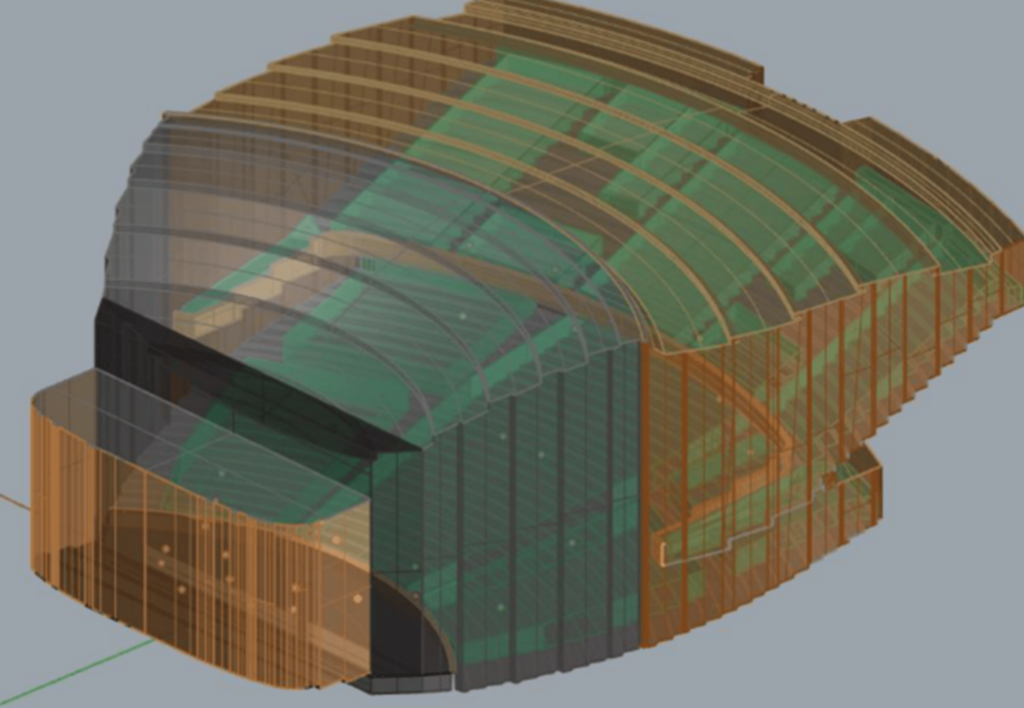PRESS RELEASE – Siemens has developed a digital twin for large event spaces. The technology makes it possible to realistically reproduce and simulate very precisely a building’s acoustics and structure. The Sound of Science application will be used for the first time in the Großes Festspielhaus – the Large Festival Hall – at the Salzburg Festival.
Sound of Silence will enable event organizers to virtually explore how acoustics change in different spatial configurations – for example, how adding acoustic panels affects the listening experience – to select the optimal acoustic scenario. Orchestral formations on the stage can also be tested and arranged in advance – before a single note is heard in the real world. This approach saves money, resources and time.
Siemens to use digital twin to simulate acoustics for the first time in the Großes Festspielhaus The “Sound of Science” simulation can measure the echo and reverberation of a sound in a 3D model and simulate how sound waves propagate in a room.
“With Sound of Science, we’re designing the future. Digital twins are not only transforming the everyday for many companies but are also creating new opportunities for the cultural and creative industries,” said Prof. Dr. Stephan Frucht, Artistic Director of the Siemens Arts Program. “In the future, we’ll be able to plan stage productions better and even simulate them acoustically in advance. We’re delighted to have the Salzburg Festival at our side as a long-standing partner, who recognizes the opportunities such innovations offer.”
Siemens will make the Sound of Science app available to selected partners from the cultural world free of charge as a demonstration application. There are currently no plans to market the application. Its simulation solutions, however, may be purchased. The Salzburg Festival’s Großes Festspielhaus is the first and only large event space to date in which Sound of Science is available. However, Siemens is planning to digitally simulate further spaces – including concert halls in Germany and England. At the Salzburg Festival, audiences will have an opportunity – unique for the time being – to use VR glasses to experience the application at the festival’s opening on July 20.

“Siemens and the Salzburg Festival share a common passion for excellence and innovation. And we’re delighted to partake in this pioneering technological development and innovation as part of our long-standing close and trust-based partnership,” said Dr. Kristina Hammer, President of the Salzburg Festival. “We’re excited to see what diverse applications will stem from Sound of Science in the future.”
The technologies used are part of the simulation solutions from Siemens Simcenter, which has been part of the company’s core business for over 15 years. The technology is mostly used in industry – for example, for the acoustic optimization of vehicle interiors or for protection against street noise. For Sound of Science, Simcenter uses a combination of impulse response measurements and ray tracing for the 3D modeling of each event space. These methods can measure the echo and reverberation of a sound and simulate how sound waves propagate in a room. Depending on the material, reflections of sound waves behave differently.
Those that bounce off a concrete wall react differently from those that hit a carpet or reach the ear directly. As a result, the simulation can reproduce the individual sound signature of each event space – in other words, its acoustic DNA.
Siemens has been working closely with the Salzburg Festival for around 30 years. Since 1999, the company has also been the festival’s main sponsor. Since 2002, the Siemens Festival Nights have been held on Kapitelplatz square during the Salzburg Festival. Since its beginning, this open-air event has provided more than one million visitors with the opportunity to experience previous and current festival productions on an LED screen free of charge. In addition, some of the Salzburg Festival’s venues are equipped with Siemens technology from the areas of building automation, security and acoustics.

